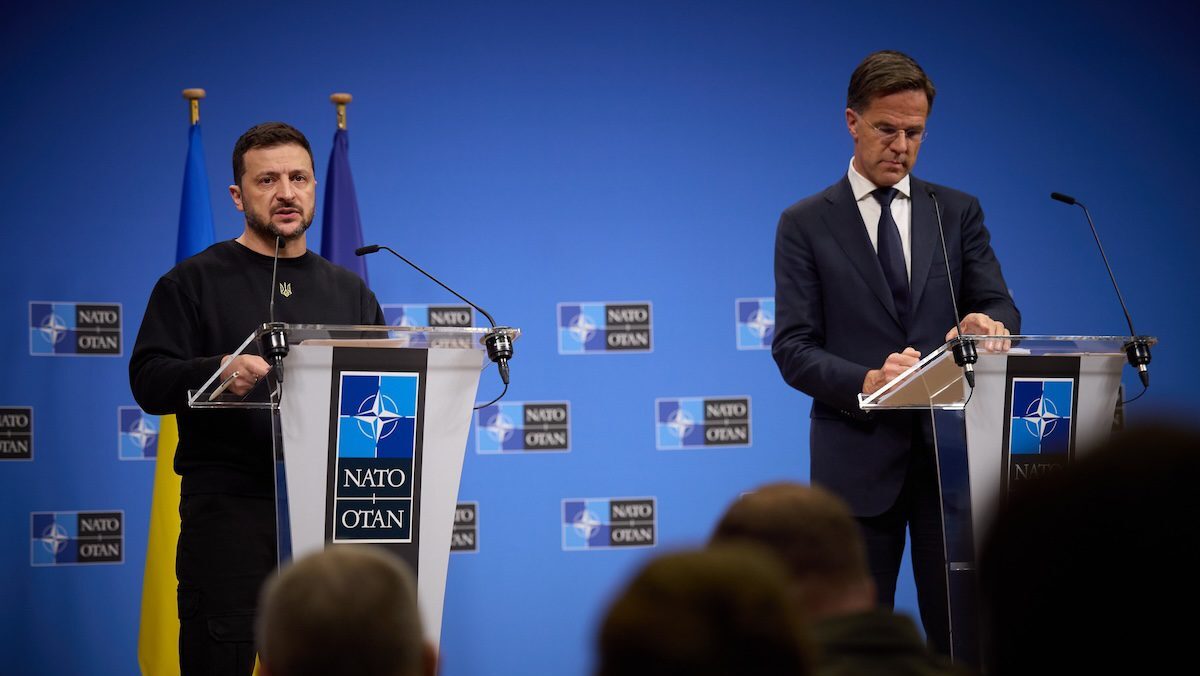
Ukrainian President Volodymyr Zelensky and NATO Secretary-General Mark Rutte.
Photo: Volodymyr Zelensky on Facebook, 17 October 2024
Ukrainian President Volodymyr Zelensky is meeting with NATO Secretary-General Mark Rutte along with several key members of the alliance in Brussels on Wednesday, December 18th, to, ahead of Thursday’s European Council summit, discuss the “next steps” in the war.
The talks are expected to be attended by leaders of Germany, Poland, Italy, and Denmark, as well as the heads of the European Commission and Council. French President Emmanuel Macron and British PM Keir Starmer will not be able to take part due to their busy schedules—Macron will miss the Thursday summit as well due to the devastation of Cyclone Chido in Mayotte, the French Indian Ocean territory—but will send their foreign ministers to take part instead.
The main focus of the discussion is expected to be the incoming Trump presidency, as the Republican president-elect has pledged to bring about a swift end to the war in Ukraine once he takes office in mid-January. There’s a growing concern in Europe that he would pull U.S. support for Kyiv to force Zelensky into making concessions to Russia and thereby ending the war.
Instead, Zelensky seeks a last-minute commitment to deliver more arms, ammunition, and military aid from the West, arguing that only progress on the battlefield can force Russia into accepting a “just and lasting peace.”
The president requested a minimum of 12-15 additional air defense systems to be delivered as soon as possible. With enough support, peace on Kyiv’s terms would be attainable by the end of next year, Zelensky believes.
Both the EU and NATO leadership tend to agree. Ahead of the talks, EU Commission President Ursula von der Leyen stressed that “bolstering Ukraine right now is not only a moral imperative—it is also a strategic imperative.”
Likewise, Secretary-General Rutte insisted that allies should focus on ramping up arms supplies and urged them not to debate the possible conditions for peace in public in order not to strengthen Russia’s narrative.
This last bit was a clear jab at Hungary’s PM Viktor Orbán, who’s been actively working with Trump to facilitate a ceasefire, which would not only prevent more unnecessary deaths but also help restore Europe’s economy that’s been strained by the war. After talking to both Putin and Zelensky, Orbán also said there was a possibility of a short-term Christmas truce with a mass prisoner exchange, but Kyiv rejected the idea.
The possibility of a mass prisoner exchange and a Christmas #ceasefire is on the table. It doesn’t matter how it got there; it is there. There are two things to do with it: accept it or reject it. One party has accepted it, while the other has apparently rejected it. But there… pic.twitter.com/DSpv7YqN37
— Orbán Viktor (@PM_ViktorOrban) December 13, 2024
Trump and Orbán are not the only ones calling for a ceasefire even if that means having to consider territorial concessions for the time being. Rutte’s predecessor, former NATO chief Jens Stoltenberg also endorsed giving up territory “temporarily” earlier this month, saying that it’s not “realistic” to expect Russia to pull out of the occupied territories in the foreseeable future.
However, that’s clearly not how the current NATO leadership thinks and it’s unlikely that the allies would implore Zelensky to consider the ceasefire agreement during tonight’s meeting.
What could be on the table, on the other hand, is the idea of deploying a 40,000-strong European peacekeeping force, pitched by President Macron to Polish PM Donald Tusk last week. Although Tusk rejected the proposal during their meeting in Warsaw and it continues to be highly controversial among other allies as well, officials say it might come up again in Brussels.
“Officially, that is not on the agenda, but since there will be a lot of important people in the same room, it cannot entirely be ruled out” that they’d discuss Macron’s plan, a NATO official said.
